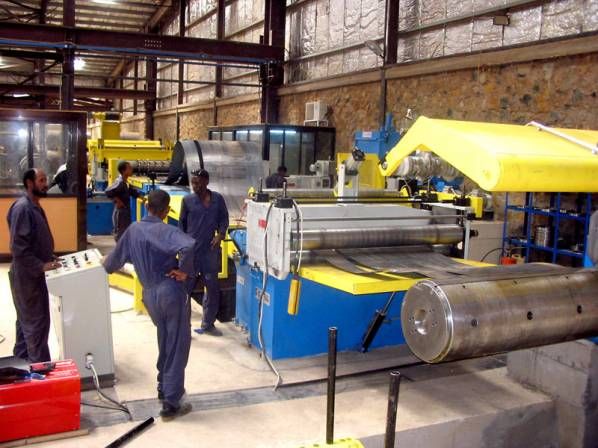Moving industries outside Khartoum: Pros and Cons

Report – Rehab Abdullah
The Federal Ministry of Industry’s announcement of its approval to transfer the investments of all factory owners who wish to transfer their industrial investments, or part of them, from Khartoum to safe states or outside Sudan, has touched the desire and wishes of many industrial owners whose interests were affected. However, the Khartoum state has set a precondition linking the moves with obtaining the approval of the Ministry of Industry and the Customs Authority.
The Ministry said in the announcement, signed by the Minister of Industry, that it had taken this step to be able to implement its emergency plan for the period of war between the Sudanese army and the Rapid Support Militia in Khartoum. Many considered the decision a good omen to begin and resume their work in safe states, which will not be affected by the decision of Khartoum Governor, Ahmed Othman Hamza, who prevented the displacement of factories and heavy equipment from his jurisdiction except after reviewing the competent authorities of the state and the relevant authorities and presenting all documents related to proof of ownership and the party’s freedom from any financial obligations towards the state.
The governor’s decision, which was based on legal and technical reasons, annoyed many factory owners who wished the transfer process, but others considered it justified and fair it in terms of the governor’s keenness to retain the factories in Khartoum after the end of the war. Rather, they considered the decision to be in the interest of stakeholders.
A member of the Union of Chambers Industrial City, CEO of Al-Dhahabi Company Limited, Engineer Ali Kambal, welcomed the decision of the Ministry of Industry and described it as a good decision.
Despite the conditions set by the governor, which on the surface appears to be impossible, he stressed that their intent is protection of rights through proof of ownership before transfer, and while some criticized the governor’s decision regarding proving that a party is free of taxes or other liabilities, they justified their criticism of the lack of such documents, as the case with many other services, due to the war and the absence of institutions concerned at the present time for obtaining them.
Kambal reckoned that this is the task of the governor of Khartoum to prepare the state’s work centers, and then the required documents will be requested, stressing that the situation during the war is very exceptional.
Although Kambal welcomed the decision to allow the transfer of factories and heavy equipment, he indicated his desire and keenness as industrialist to continue working in Khartoum despite the war conditions, so as to help revamp the state’s economy.
Kambal warned that deporting factories was very expensive, but he acknowledged the necessity of operating them and creating job opportunities, however he found no reason to object and did not mind moving them.
Also, Kambal pointed out the huge losses incurred by business owners and the industrial sector, which affected the national capital, but he and counted them as losses that come as a sacrifice for the homeland.
On the other hand, the former Treasurer of the Sudanese Employers Union, Ihab Nour El-Din Saeed, said in a statement to (Sudan Events) that the purpose of allowing transfer of factories from Khartoum is to protect the remaining machines or to restart them if possible. He said that this is the least to be done, as he criticized the governor’s requirements and said that it would have been more beneficial for the governor to protect the industrial facilities and industrial areas instead of indirectly causing the loss of the remaining investors’ rights and money, and that at least he would help bring the machines to safety.
Ihab revealed that the initial statistics of losses in the industrial sector in Khartoum indicate that 90% of them have been completely or partially destroyed, indicating that all seven industrial areas in Khartoum State are still war zones and cannot be accessed.
The former Secretary General of the Federation of Chambers of Industry, Ashraf Salah, acknowledged that the war affected the infrastructure in the capital, and the impact on the industrial sector was frightening in terms of destruction as a result of the mutual bombing between the army and the Rapid Support Militia, knowing that more than 80% of the industrial sector is located inside the capital, in addition to direct destruction of buildings, machinery and equipment, as well as the spread of looting and complete vandalism.
Ihab told (Sudan Events) that the decision of the governor of Khartoum was taken in light of these very complex circumstances, and that it is a decision prohibiting the transfer of factory and heavy equipment except through procedures for providing the necessary documents and paying fees and financial obligations.
Ashraf stressed the difficulty of fulfilling these requirements approved by the governor due to the complexities of the war and its consequences in Khartoum State in the current period, and he considered it a decision based on a security vision to protect factory equipment from looting, theft, random deportation, etc. However, he considered the wording of the decision in formulating the justifications as unfair, and pointed out that the decision of the Ministry of Industry is the body responsible for factories in all of Sudan. The Ministry decision was issued after the governor’s decision and not before it as was rumored.
He believes that the security justification related to preserving property from looting is a logical justification, however, it must not hinder the desire of the owners of industrial facilities to transfer them to safe states, and then measures can be taken in safe states to ensure the integrity of the procedures later, and subject to the resumption of any factory operation upon, noting that the deportation process is partial and will not benefit employers much, nor will it benefit the Sudanese economy in general. Perhaps it will not benefit even the establishments and owners of industrial facilities unless by stopping the war.
Salah revealed the billion-dollar losses incurred by the industrial sector due to the war, stressing that they are extremely huge and cannot be accurately determined unless the war stops and a complete inventory is conducted on the ground. However, he revealed that preliminary statistics showed that the losses exceed ten billion dollars, in addition to stopping production for a period of 8 months, which makes it is necessary to compensate for the destroyed and looted industrial sector facilities, as he believed that what was required was to stop the war immediately.
“We add our voice to the group that calls for stopping the war.” He added.



